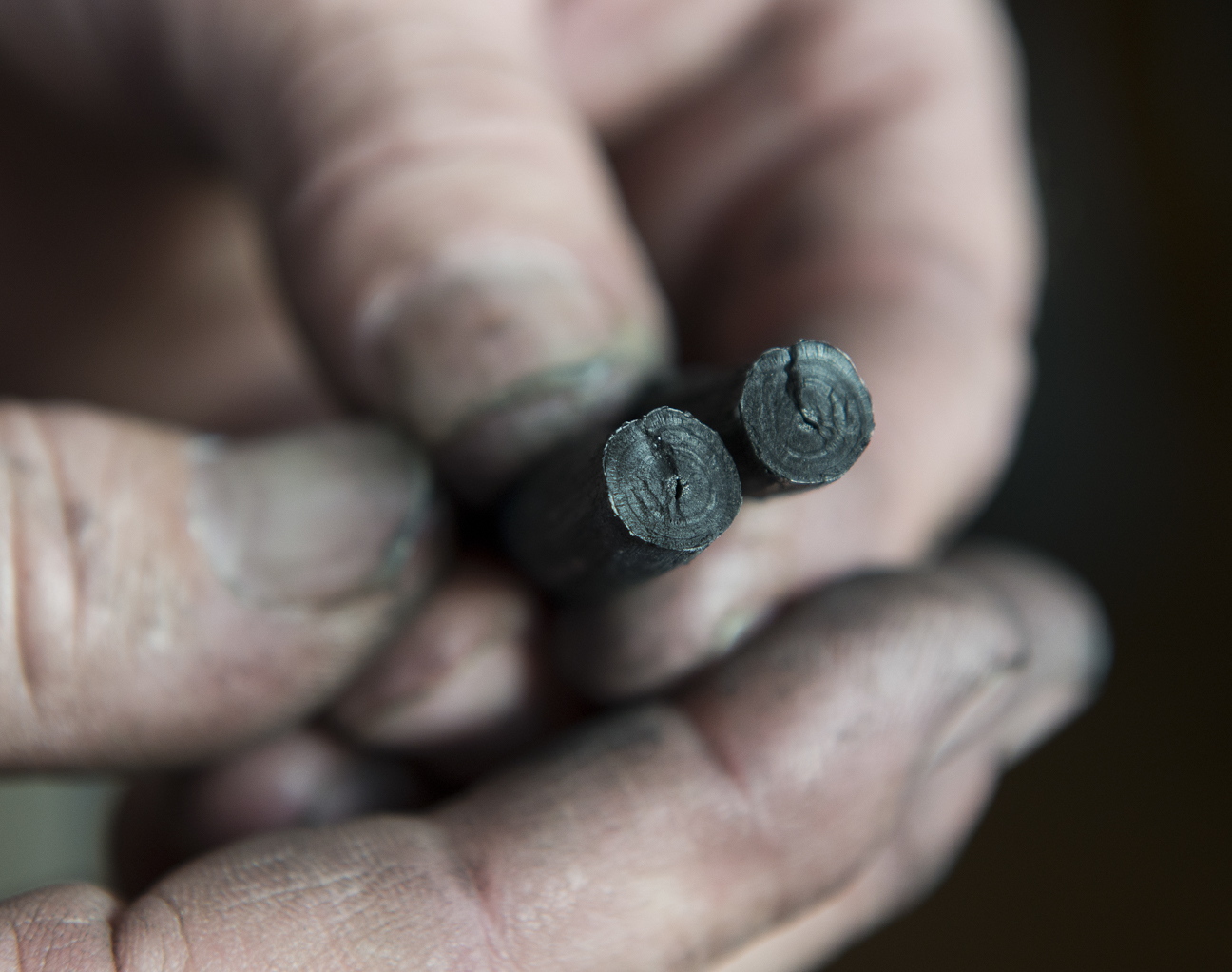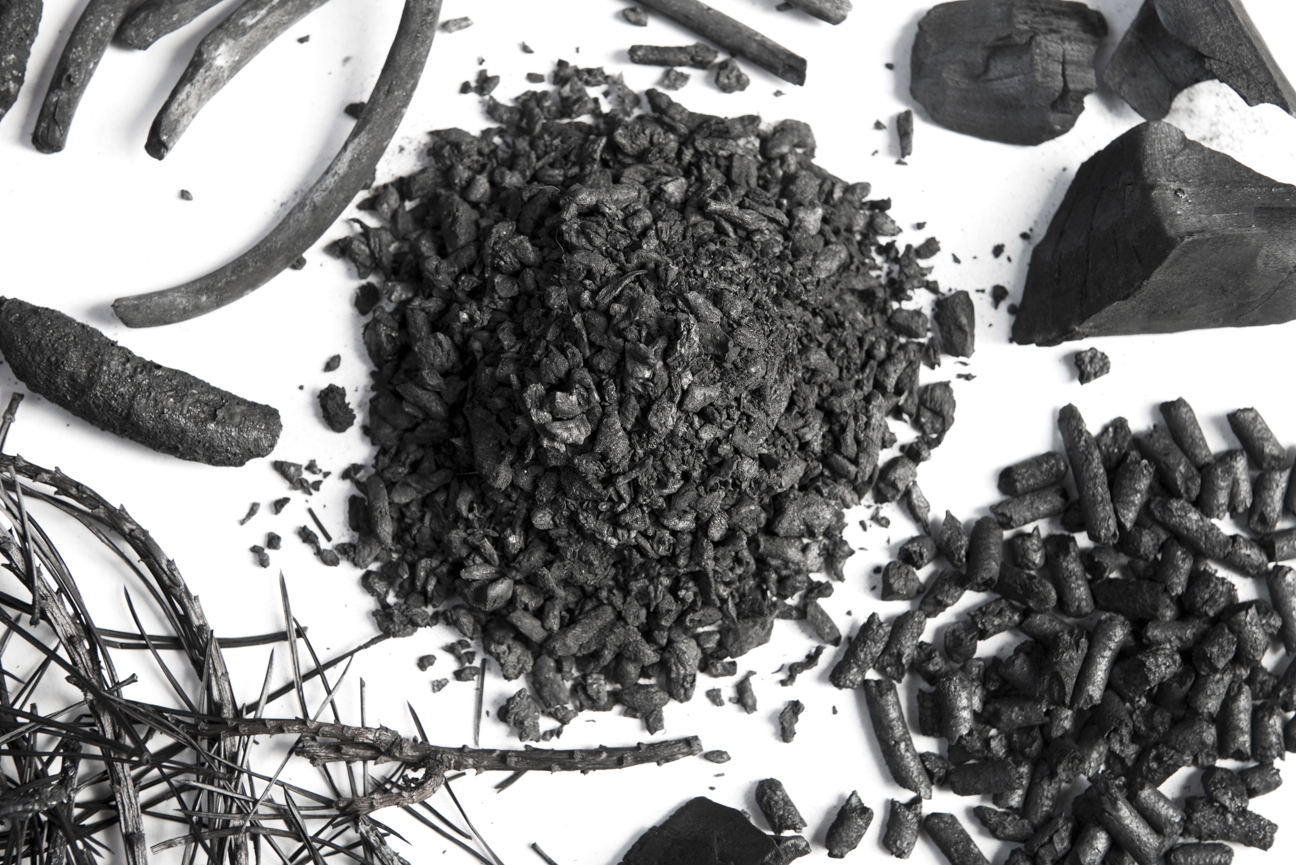>Listen to a radio segment on biochar
–by Dan Lemke
The inspiration for a newly-patented mobile gasification unit (Patent #8888874) came when Curtis Borchert’s wife read about the benefits of biochar for improving soil quality in an organic gardening magazine. Borchert, of Ada, Minnesota, attempted to produce biochar for his wife’s garden by sealing wood from the family’s Christmas tree in a popcorn tin and tossing it into a wood burning stove. That experiment ended with a pile of charred material on the floor, blaring smoke alarms and an unhappy guide dog. But it provided the spark that helped ignite a new business and new opportunities for biomass.
Biochar is created through the carbonization of biomass materials like wood or crop residue, usually accomplished through processes such as pyrolysis or gasification that involve charring the product in the absence of oxygen. Char has been used for centuries as a soil additive to help increase organic matter and retain water and nutrients.
Borchert and his business partners Brian Borgen of Hendrum, Minnesota, and Noah Storslee of Ada, started their company called Char Energy, LLC to improve upon Borchert’s initial popcorn tin idea and develop a working prototype for a mobile gasifier. Using parts scavenged from an old combine and a wood furnace, they developed a portable gasification unit that could convert biomass into biochar while also producing syngas.
Unlike other systems, the Char Energy technology conveys biomass in horizontal tubes through a heat chamber that bakes the biomass to produce biochar and syngas. Some of the gas is recaptured and used to power the mobile system.
The company applied for and was awarded a patent for their technology in November 2014. The patenting process is typically time and resource consuming, especially if there are challenges to the patent. For Char Energy, it took 18 months to get their patent at a cost of less than $1,000. It also went through the process without a single challenge, which Borchert says rarely happens. That was the case because there is nothing out there quite like it.
Not only is the mobile gasifier technology unique, so too is the char it produces.
“Our char is different because it’s baked, the organic matter isn’t burned like in an up- or down-draft gasifier,” Borchert says. “We can produce consistent biochar every time. We don’t have to worry about moisture effecting how it burns. We set the temperature and the biomass doesn’t move until the chamber gets to that temperature.”
Borchert says they source sugar beet pulp as their primary feedstock because it’s readily available, is a consistent product and feeds well through their system due to its particle size. However, the system can work on nearly any available organic material from wood to hay.
AURI has been working with Char Energy since 2011, gathering data to show what their technology was actually producing. This information was also used to help support the patent application.
“They are really innovative in their process,” says Becky Philipp, AURI project manager. “They are so creative in how they use all their available resources.”
Using the char for improving soil was the initial intended use, but after conversations with AURI staff, other potential opportunities became clear. In addition to the land applications, the char was also tested as a renewable fuel source. Next steps include evaluating it as a filter material for removing nutrients to improve water quality.
The char’s current primary use is for oil absorption. The char is placed in burlap bags to contain and absorb crude oil that is spilled when large tanks are moved.
AURI senior scientist Alan Doering worked with Char Energy to test their biochar for several different applications. What he found was a pretty remarkable and very thirsty product.
Doering says one gram of biochar can absorb nearly 20 grams of oil, giving it an absorption rate of nearly 2,000 percent. Plus, it is oleophilic, so it resists water, yet absorbs oil. The biochar itself could be used as fuel because its energy value can go as high as 11,000 Btu per pound, coal, for example, can average 6,900-14,350 Btu.
Work also continues to secure funding to test biochar’s capacity for removing nitrates and phosphorous from water runoff.
Char Energy is building another mobile gasifier made with all original parts that they hope to have completed by this summer. They’re optimistic the technology will be of interest to others around the country for producing energy and char. There’s interest in some areas of the country where propane shortages have been an issue to use the syngas the system produces to dry grain. Syngas, another product of gasification, may be able to replace propane in some areas of the country with propane shortages. Farmers have shown interest in using the syngas to dry their grain.
“The only byproducts of this process are syngas and biochar, both of which are usable,” Borchert adds. “There isn’t a waste product that you have to get rid of.”
Char Energy is also hoping to pursue certification for their biochar from the International Biochar Institute. It’s all part of the process of growing the business.
“We wouldn’t be where we are today without help from AURI,” Borchert says. “They’ve helped us come up with a lot of ideas like using the char on oil and for water quality. Having these folks around has been a big help for us.”
 Idea to reality: Build a mobile gasifier that can turn agriculture fibers into a charcoal-like residue, called biochar, that can be used for absorbing liquids, improving water quality and soil characteristics, and creating energy.
Idea to reality: Build a mobile gasifier that can turn agriculture fibers into a charcoal-like residue, called biochar, that can be used for absorbing liquids, improving water quality and soil characteristics, and creating energy.
AURI’s role: AURI gathered data to find out what chemicals and nutrients were in the biochar and tested its absorbency. Further work on this high-potential project is ongoing.
Outcomes: Char Energy was awarded a patent for their technology in November 2014. One future goal is to test the biochar’s capacity for removing nitrates and phosphorous from water runoff.
Podcast: Play in new window | Download (939.9KB) | Embed

